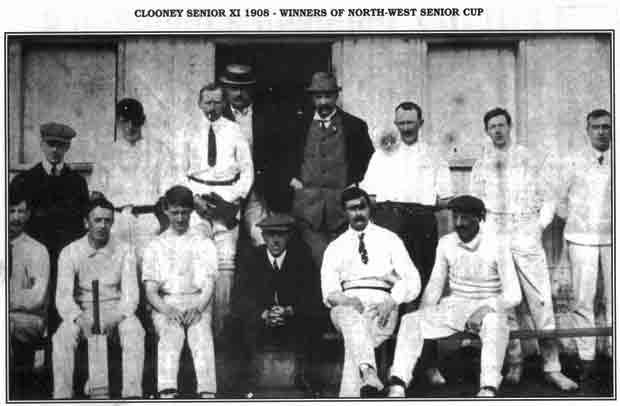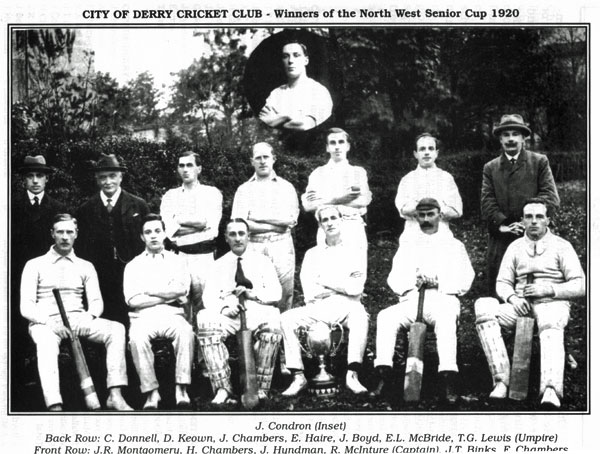When war against Germany broke out in early August 1914, the North West of Ireland cricket programme for the season was virtually completed. Sion Mills had defeated City of Derry in the Senior Cup Final while the winners of the North West Senior League, Clooney Cricket Club, had by then a six point lead in the Senior League Championship over both the Sion Mills Cricket Club and the City of Derry Cricket Club and an eight point lead over the Buncrana Cricket Club.

From early August 1914 all official cricket under the jurisdiction of the Northern Cricket Union and the North West Cricket Union ceased although some schools cricket continued periodically. Also during the war years a few matches were arranged to help the War Fund.
In Dublin however, club cricket did continue, in a small way, throughout the war. However as the months and years slipped in the whole Country was to suffer great turmoil and cricket seemed due for long postponement.
In 1914 Irishmen accounted for approximately ten per cent of the British Army with two hundred thousand Irishmen enlisting. Around fifty thousand Irishmen made the supreme sacrifice in the ensuing three year period of hostilities throughout Europe.
As if matters were not bad enough for many in Ireland during the war years, the Easter Rising, a failed attempt to establish a Republic of Ireland, began on Easter Monday 1916. Although it lasted less than a week, the centre of Dublin was severely damaged despite being patrolled by the British Army. Many lives were needlessly lost on both sides in the Rising.
It was a bloodied and butchered Europe that emerged from the Great War in 1919 and the Irish survivors of the war returned to the Home Rule dispute that had threatened internal strife in 1914. Civil War was almost inevitable after the 1916 rising. Partition appeared the only solution and the British Prime Minister, Lloyd George, introduced a new Home Rule Bill early in 1919 to that effect.
Partition resulted in an upsurge in violence in Northern Ireland over a three year period ending somewhat with the signing of the Anglo Irish Treaty on the 6th December 1921, a Treaty that established the Irish Free State as a self governing dominion.
After the horrors of the Great War and with sectarian violence on the increase in Northern Ireland, it was a great achievement just to get the various cricket competitions started again in 1919, especially in the North West of Ireland, although only five clubs contested the Senior League.
In 1920 civil troubles curtailed the North West Cricket programme and in Londonderry in June, 19 people were killed and many wounded and there were probably many more casualties not reported to the authorities. Obviously no cricket was played during this period of sectarian generated hate. One of the most pathetic tragedies of the riots was the shooting of Mr P J Plunkett, who was a member of the City of Derry Cricket Club. I understand that Mr Plunkett, who was a Roman Catholic was talking to some of his fellow cricketers and he produced a telegram, which he had received from his wife in Belfast, asking him if he were safe. He telegraphed soon afterwards a message allaying his wife's fears and stating that he would proceed to Belfast by the morning train on the following day. He fell a victim to a sniper's bullet in Bishop Street, Londonderry in less than an hour afterwards. The troubles eased by July and some cricket was played but more trouble broke out during August and very little cricket was played from then until the end of the season. Buncrana Cricket Club, County Donegal, who had competed in the North West
Senior League prior to the war scratched all their fixtures in the North West Senior League in 1919 and 1920. Unfortunately cricket all but ceased in County Donegal after Ireland was partitioned, except in the east of the County where Ballybofey, Burt, Convoy, Fort Dunree, Raphoe and St Johnston Cricket Clubs maintained its presence under the jurisdiction of the North West of Ireland Cricket Union (fourteen cricket clubs existed throughout County Donegal at one time or other pre the First World War.
The Military brought cricket to Ireland some two hundred and twenty two years earlier and their presence remained particularly in Ulster and the North West of Ireland to well after the Second World War. Various Regiments competed in the North West Senior League and Cup competitions pre and post First World War with the First Dorset
Regiment in 1919 defeating the City of Derry Cricket Club in the final of the North West Senior Cup while earlier in 1912 the Royal Scot Fusiliers lost to Strabane in the North West Senior Cup Final.

It would be fair to comment that the various cricket grounds used pre and early post war required little maintenance, being in most cases, unlike today's cricket grounds, void of social facilities etc. (Refreshments etc usually provided by the home team at a nearby Hotel or in some cases, weather permitting, in the ground). I would guess that preparation for a match was minimal although judging from photographs of the period facilities and grounds appeared very good, sometimes decked out in bunting, particularly if there was a Military involvement plus usually the presence of a Military Band that played a rendering of tunes during the match.
